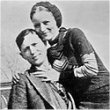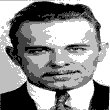Bonnie And Clyde – Infamous Criminals
March 22, 2009 by admin
Filed under Infamous Criminals
 Bonnie Parker (October 1, 1910 – May 23, 1934) and Clyde Barrow (March 24, 1909 – May 23, 1934) were notorious outlaws, robbers, and criminals who, with their gang, traveled the Central United States during the Great Depression. Their exploits were known nationwide. They captured the attention of the American press and its readership during what is sometimes referred to as the “public enemy era” between 1931 and 1934. Though their gang was notorious for their bank robberies, Barrow preferred to rob small stores or gas stations. The gang was believed to have killed at least nine police officers, among several other murders.
Bonnie Parker (October 1, 1910 – May 23, 1934) and Clyde Barrow (March 24, 1909 – May 23, 1934) were notorious outlaws, robbers, and criminals who, with their gang, traveled the Central United States during the Great Depression. Their exploits were known nationwide. They captured the attention of the American press and its readership during what is sometimes referred to as the “public enemy era” between 1931 and 1934. Though their gang was notorious for their bank robberies, Barrow preferred to rob small stores or gas stations. The gang was believed to have killed at least nine police officers, among several other murders.
Bonnie and Clyde were killed on May 23, 1934, on a desolate road near their Bienville Parish, Louisiana hideout. Below is a video that shows their death scene – Shot by an amateur photographer five minutes after the event.
After this film was taken, the bullet-riddled Ford containing the two bodies was towed to the Conger Furniture Store & Funeral Parlor. The firm was located on Railroad Avenue in downtown Arcadia, Louisiana across from the Illinois Central train station (which is now a historical museum containing Bonnie and Clyde artifacts.) Preliminary embalming was done by C.F. “Boots” Bailey in the small preparation room in back of the furniture store.[ It was estimated that the northwest Louisiana town swelled in population from 2,000 to 12,000 within hours, the curious throngs arriving by train, horseback, buggy, and plane. Beer which normally sold for 15 cents a bottle jumped to 25 cents; food quickly sold out.
Walkabout’s Bonnie and Clyde song with photos of Bonnie & Clyde
The Story of Bonnie And Clyde
Of how he lived and died;
If you’re still in need
Of something to read
Here’s the story of Bonnie and Clyde.
Now Bonnie and Clyde are the Barrow gang.
I’m sure you all have read
How they rob and steal
And those who squeal
Are usually found dying or dead.
There’s lots of untruths to these write-ups;
They’re not so ruthless as that;
Their nature is raw;
They hate the law–
The stool pigeons, spotters, and rats.
They call them cold-blooded killers;
They say they are heartless and mean;
But I say this with pride,
That I once knew Clyde
When he was honest and upright and clean.
But the laws fooled around,
Kept taking him down
And locking him up in a cell,
Till he said to me,
“I’ll never be free,
So I’ll meet a few of them in hell.”
The road was so dimly lighted;
There were no highway signs to guide;
But they made up their minds
If all roads were blind,
They wouldn’t give up till they died.
The road gets dimmer and dimmer;
Sometimes you can hardly see;
But it’s fight, man to man,
And do all you can,
For they know they can never be free.
From heart-break some people have suffered;
From weariness some people have died;
But take it all in all,
Our troubles are small
Till we get like Bonnie and Clyde.
If a policeman is killed in Dallas,
And they have no clue or guide;
If they can’t find a fiend,
They just wipe their slate clean
And hang it on Bonnie and Clyde.
There’s two crimes committed in America
Not accredited to the Barrow mob;
They had no hand
In the kidnap demand,
Nor the Kansas City Depot job.
A newsboy once said to his buddy:
“I wish old Clyde would get jumped;
In these awful hard times
We’d make a few dimes
If five or six cops would get bumped.”
The police haven’t got the report yet,
But Clyde called me up today;
He said, “Don’t start any fights–
We aren’t working nights–
We’re joining the NRA.”
From Irving to West Dallas viaduct
Is known as the Great Divide,
Where the women are kin,
And the men are men,
And they won’t “stool” on Bonnie and Clyde.
If they try to act like citizens
And rent them a nice little flat,
About the third night
They’re invited to fight
By a sub-gun’s rat-tat-tat.
They don’t think they’re too smart or desperate,
They know that the law always wins;
They’ve been shot at before,
But they do not ignore
That death is the wages of sin.
Some day they’ll go down together;
They’ll bury them side by side;
To few it’ll be grief–
To the law a relief–
But it’s death for Bonnie and Clyde.
Written by Bonnie Parker
John Dillinger – Infamous Criminals
March 16, 2009 by admin
Filed under Infamous Criminals
 John Herbert Dillinger (June 22, 1903–July 22, 1934) was a bank robber in the Midwestern United States during the 1930s. Some considered him a dangerous criminal, while others idolized him as a present-day Robin Hood. He gained this latter reputation (and the nickname “Jackrabbit”) for his graceful movements during heists, such as leaping over the counter (a movement he supposedly copied from the movies) and many narrow getaways from police. His exploits, along with those of other criminals of the Great Depression, such as Bonnie and Clyde and Ma Barker, dominated the attention of the American press and its readers during what is sometimes referred to as the public enemy era (1931-1935), a period which led to the further development of the modern and more sophisticated Federal Bureau of Investigation.
John Herbert Dillinger (June 22, 1903–July 22, 1934) was a bank robber in the Midwestern United States during the 1930s. Some considered him a dangerous criminal, while others idolized him as a present-day Robin Hood. He gained this latter reputation (and the nickname “Jackrabbit”) for his graceful movements during heists, such as leaping over the counter (a movement he supposedly copied from the movies) and many narrow getaways from police. His exploits, along with those of other criminals of the Great Depression, such as Bonnie and Clyde and Ma Barker, dominated the attention of the American press and its readers during what is sometimes referred to as the public enemy era (1931-1935), a period which led to the further development of the modern and more sophisticated Federal Bureau of Investigation.
Robbery Career
Dillinger embraced the criminal lifestyle behind bars, learning the ropes from seasoned bank robbers like Harry Pierpont of Muncie, Indiana and Russell “Boobie” Clark of Terre Haute. The men planned heists that they would commit soon after they were released. Once Dillinger was released from Indiana State Prison at Michigan City, he helped conceive a plan for the escape of Pierpont, Clark and several others, most of whom worked in the prison laundry. The group known as the “first Dillinger gang” included Pierpont, Clark, Charles Makley, Edward W. Shouse, Jr., of Terre Haute, Harry Copeland, “Oklahoma Jack” Clark, Walter Dietrich and John “Red” Hamilton. Homer Van Meter and Lester Gillis (a.k.a. Baby Face Nelson) were among those who joined the “second Dillinger gang” after he escaped from the county jail at Crown Point, Indiana.
Among Dillinger’s more celebrated exploits was his pretending to be a sales representative for a company that sold bank alarm systems. He reportedly entered a number of Indiana and Ohio banks and used this ruse to assess security systems and bank vaults of prospective targets. Another time, the gang pretended to be part of a film company that was scouting locations for a “bank robbery” scene. Bystanders stood and smiled as a real robbery ensued and Dillinger and friends rode off with the loot. Stories such as this only served to increase Dillinger’s burgeoning legend.



 Don't miss another one of our free bi-monthly Mystery Digest newsletters. Subscribe and receive two minute mysteries, mystery puzzles and other interesting articles two times a month.
Don't miss another one of our free bi-monthly Mystery Digest newsletters. Subscribe and receive two minute mysteries, mystery puzzles and other interesting articles two times a month.